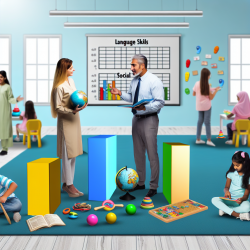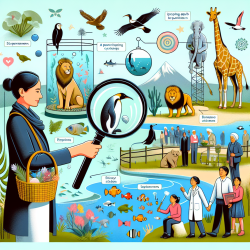Classroom aides play a crucial role in the educational and social development of students, especially those who may be struggling academically or socially. A groundbreaking program designed by a school psychologist and a speech-language clinician from the Winnipeg area offers a blueprint for enhancing the skills of classroom aides, thereby improving the overall learning environment for students. This interdisciplinary language/social skills group was specifically aimed at Grade 2 students exhibiting below-grade-level academic achievement, poor work habits, lack of competent social skills, and pragmatic language difficulties. The insights from this program can significantly help practitioners improve their skills and encourage further research into effective educational interventions.
The program focused on four key areas:
- Self-awareness
- Awareness of others
- Listening skills
- Verbal expression
These sessions, lasting forty-five minutes, were held two to four times weekly for eight months, alternating group supervision between the school clinicians and a teacher aide. The teacher aide received training in general principles for child development and behavior, emphasizing the importance of well-prepared aides in the educational setting.
One of the standout features of this program was its emphasis on both direct and indirect learning. Direct learning was facilitated through the content of the activities, while indirect learning was encouraged by structuring group activities to promote independent problem-solving skills. This approach helped students in asking for information, looking for alternatives, expressing willingness to try, cooperation, and taking responsibility for themselves.
Significant improvements were observed in the students involved in the group. These included an increased willingness to risk verbal responses, a reduction in conflicts, an improvement in the quality and quantity of verbalizations, and the internalization of the rules and strategies employed in the group. Motivation among group members remained high throughout the eight months, and the program was positively received by their peers. This positive reception may have been aided by the non-academic activities and the selection of students who were not identified as "behavior problems."
The program also highlighted the necessity of incorporating activities in "real-life" locations to promote the generalization of skills learned. The frequency of the sessions was crucial for the amount of practice and reinforcement needed to build any degree of stability in the newly acquired skills. Furthermore, the training provided to the aide in general principles for child development and behavior was deemed essential for the program's success.
This innovative program underscores the critical role of classroom aides in supporting the development of language and social skills among students. By focusing on self-awareness, empathy, listening skills, and verbal expression, the program offers a comprehensive approach to addressing the complex interplay between language, self-concept, social competence, and academic performance. The success of this program demonstrates the potential benefits of interdisciplinary collaboration and the importance of adequately training classroom aides to implement such interventions effectively.
For educators, administrators, and support staff interested in adopting or adapting this program, it is essential to consider the specific needs of their student population and the resources available. Engaging parents and teachers in the process, as was done in this program, can also enhance the effectiveness of the intervention and ensure a supportive environment for students' growth and development.
In conclusion, the interdisciplinary language/social skills group designed for classroom aides offers valuable insights into enhancing educational outcomes for students struggling with language and social skills. By implementing the outcomes of this research or encouraging further research in this area, practitioners can significantly improve their skills and contribute to a more inclusive and supportive educational environment.
To read the original research paper, please follow this link: An Inter-disciplinary Language/Social Skills Group Designed For Classroom Aides.










